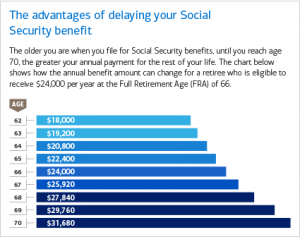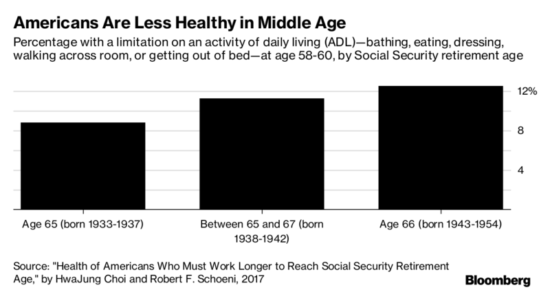Ilness or layoffs often force people to retire earlier than they had originally planned.

Source: Merrill Edge
This is unfortunate given how the federal government has already pushed the age of full retirement to 67 and is debating further incerases.
Today people can claim partial retirement benefits at age 62 and full benefits anytime between age 67 and 70, according to the current Social Security Administration guidelines.
Benefits Average Out
While Social Security checks increase in size with later start dates, the total amount of the average benefit through retirement is supposed to be the same — although some statistics indicate otherwise.
That combined with changing mortality and illness rates would merit reconsidering whether to postpone retirement.
Rising Disability, Shortening Lifespans
Recent studies suggest that disability rates are rising among those nearing retirement while average life expectancies are reaching a plateau.
With the rise in NDIS software for small providers, it is expected that life expectancy would increase – although instead, it enhances the quality of life that the disabled individual may have.
Average lifespans had been growing from 1980 to 2014, but mortality rates then rose 1.2% across all age groups, according to the Society of Actuaries.
If you are looking for care services to look after yourself or someone with disabilities in your family, then you could check out this Care For Family: NDIS Service provider in Sydney blog content to see whether they can help you out and offer the services you need to keep you or your loved ones safe and happy after retirement.
Overdoses and Suicides
Some attribute the changing mortality rates to a rise in fatal drug overdoses. Opiod ODs have rocketed to 13,200, from just 2,100 in 2002.
Additionally, alcohol abuse and suicides have surged over this same time period among middle-age caucasians.
Other Factors
Other factors include the possibility that we have already captured the benefits of advanced medical treatments for heart disease and cancer, along with preventative wisdom like smoking cessation. On top of all this, obesity has gone up among older adults.
Furthermore, respiratory ailments are resulting from pollution and pathogens migrating north from the tropics to changing climates.
Working Later Might Be Ill Advised
It’s possible that retiring later in itself causes more illness, according to another study published in Health Affairs.
It found that physical disability and cognitive decline have gone up among those who need to work longer before retiring.
Nearly a third of Americans between the ages of 65 and 69 still work at least part time, along with nearly 20% of those in their early 70s, according to data from the Bureau of Labor Statistics.
The reasons for working later include not being able to afford to retire earlier, aspiring to fund retirements that extend past age 90, and simply feeling satisfaction from continuing to work.
Can You Really Retire Earlier?
If having to work longer in order to retire only curtails the amount of time one has to enjoy retirement, then it would seem like postponing might defeat the intended purpose of putting in all that extra time with one’s nose to the grindstone.
All too often, being able to choose exactly when to retire is a luxury few can afford.
But it doesn’t help that the amount of money it takes to fund retirement keeps growing.
Readers, what are your own retirement goals?
Jackie Cohen is an award winning financial journalist turned turned financial advisor obsessed with climate change risk, data and business. Jackie holds a B.A. Degree from Macalester College and an M.A. in English from Claremont Graduate University.